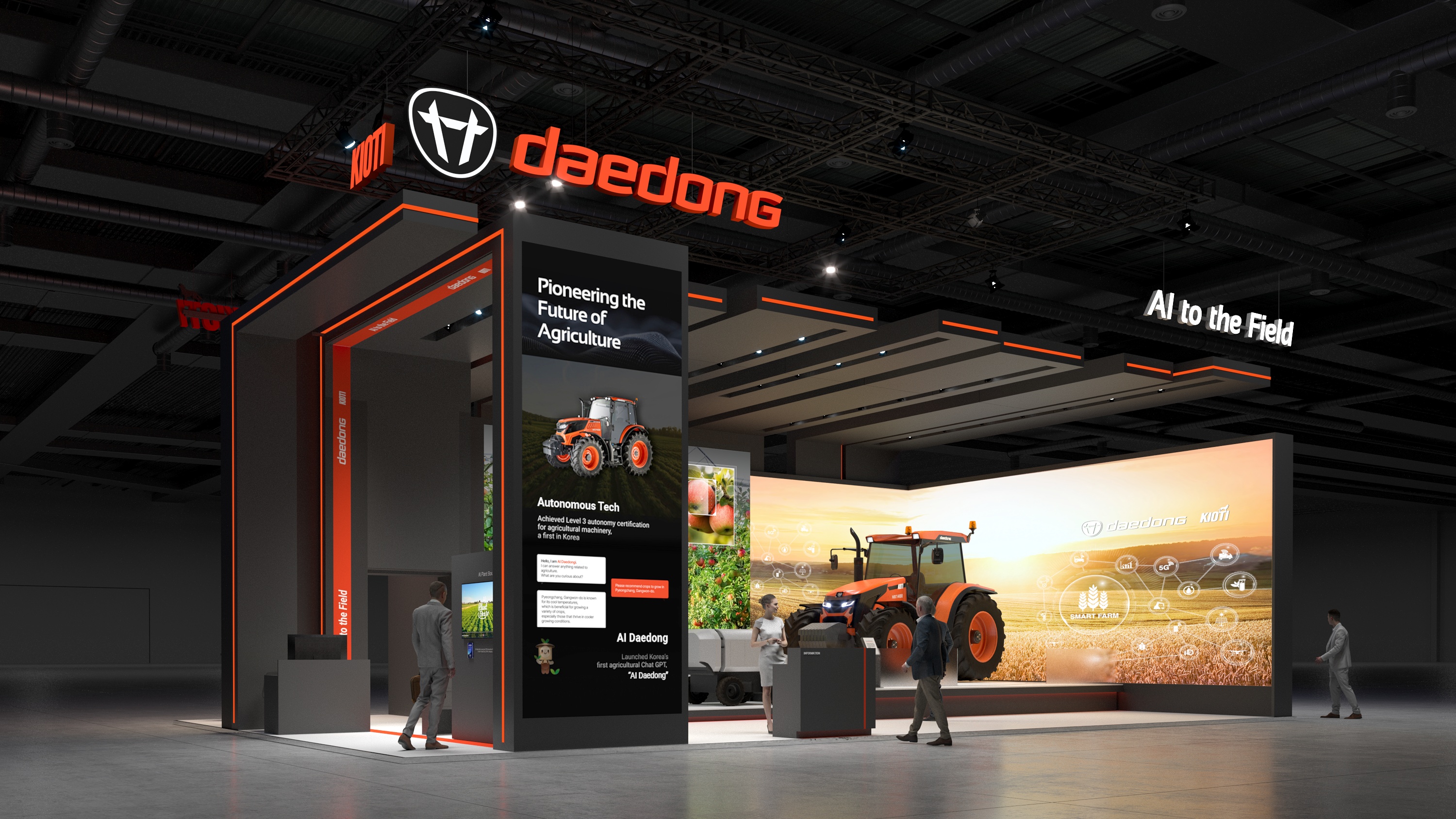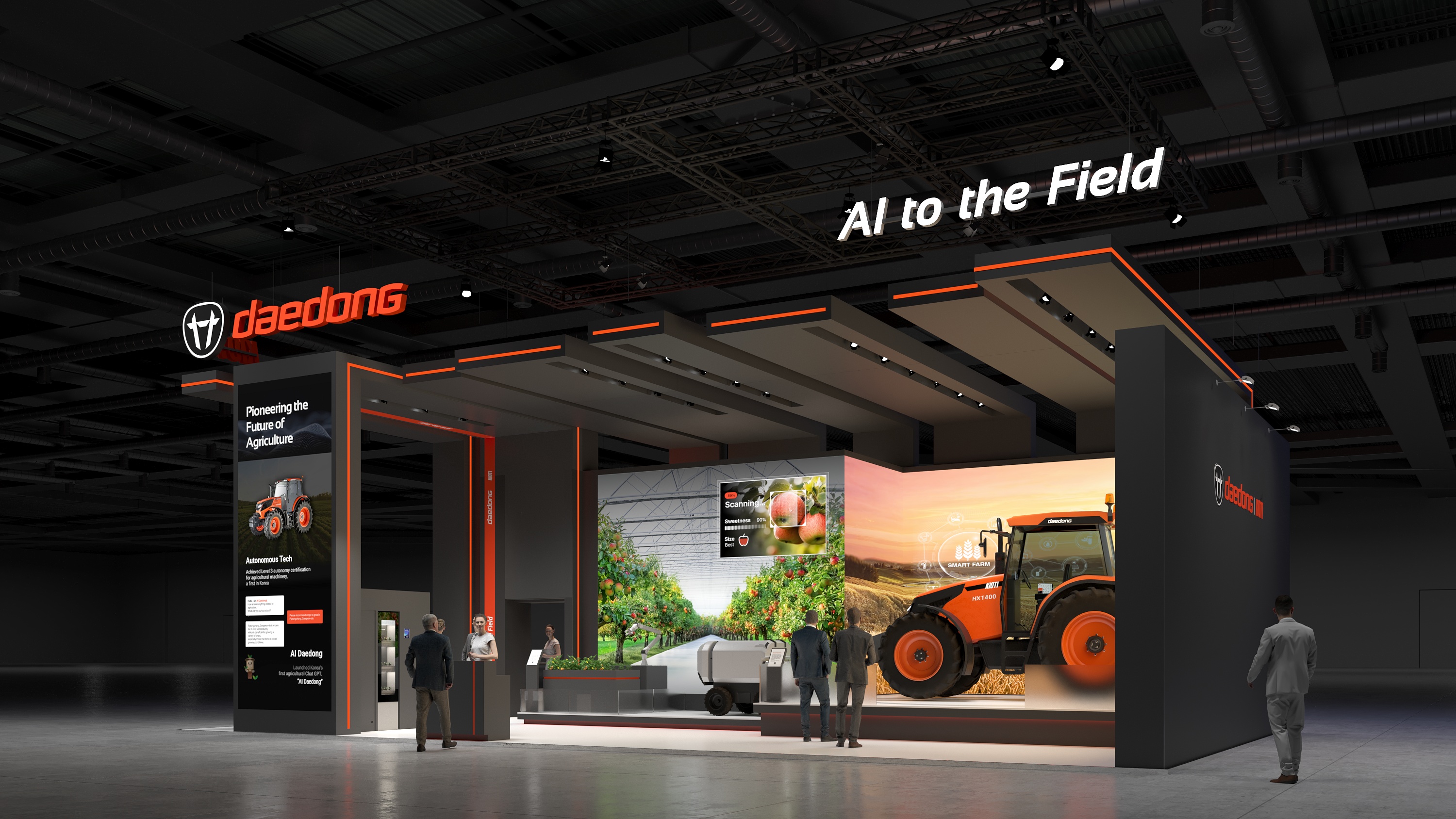Daedong to unveil its blueprint for future agriculture powered by AI at CES 2025
Daedong to unveil its blueprint for future agriculture powered by AI at CES 2025
- First agricultural machinery company to participate in CES, and present its "AI to the field" vision that applies AI to agricultural sites
- Global debut of multi-functional agricultural robots, precision agriculture, and AI cultivators, offering visitors hands-on experience
- Daedong CEO Kim Jun-Sik and key executives to visit CES to learn worldwide AI technology trends
Daedong (co-CEOs Kim Jun-Sik and Won Yu-Hyun), a leader and pioneer in future agriculture, announced on December 26 that it plans to participate in CES 2025, which gets underway from January 7 to 10 (local time) at the Las Vegas Convention Center (LVCC) in the United States, for the first time in the industry. The company will showcase its AI agricultural technology aimed at becoming a global high-tech agricultural enterprise.
Since declaring its vision to become a leading company in future agriculture back in 2020, Daedong has been developing agricultural technology powered by AI that minimizes labor and production costs while maximizing agricultural productivity with R&D that applies the latest AI and robot technology to all areas of agriculture. With its own booth at CES 2025, the company will showcase advanced AI-powered ▲multi-functional agricultural robots, ▲precision agriculture, and ▲AI plant cultivators under the concept of “AI to the field.”

■ More than just transporting robots, Daedong to unveil the industry's first multi-functional agricultural robot powered by AI
First, Daedong’s multi-functional agricultural robot[i] will be the first of its kind unveiled at CES 2025 and marks a milestone in Daedong's agricultural robot business. Daedong founded an R&D company in the AI and robotics field this year to develop an on-device AI platform that enables agricultural machinery and robots to perform autonomous unmanned farming operations. To that end, the company has organized and completed field demonstrations of an industry-first vision sensor-based tractor that recognizes farmland, obstacles, and attachments to perform autonomous operations, as well as a transport robot that autonomously follows workers. This transport robot will be launched in the first quarter of next year.
Taking strawberry farming for example, the multi-functional agricultural robot is expected to demonstrate its ability to understand voice commands from humans through AI software installed on the robot, perceive its surroundings, and independently judge and perform various tasks. From transplanting strawberry seedlings to pruning flowers and removing runners (unnecessary branches), a single robot can manage the entire strawberry growth cycle end-to-end with a single AI model. This presents the possibility of overcoming the limitations of existing agricultural robots that are confined to automating specific tasks such as seeding, harvesting, and sorting.
■ Daedong plans on showcasing an AI plant cultivator that automatically adjusts the growing environment
Daedong is also exhibiting an AI plant cultivator that won the CES 2025 Innovation Award. What makes this product stand out from existing cultivators is its ability to automatically adjust the growing environment for each crop and predict harvest time by analyzing growth conditions, based on AI and agricultural big data using advanced “Smart Farming” technology. When a seed capsule is inserted into the cultivator, the AI software-embedded camera recognizes the variety through captured images, assesses the growth state, and automatically controls the environment including temperature, humidity, light intensity, and nutrient solution to suit the plant.
The company is also introducing 22 varieties of general and functional crops, including Youngia denticulata, which is being considered for distribution with the cultivator. Since 2022, as part of its Green Bio business[ii], Daedong has been writing cultivation manuals to maximize the functional components of crops beneficial to health through crop cultivation and variety improvement research, securing seed IP (Intellectual Property) with higher cultivation value than existing varieties. To date, it has applied for two types of functional crops, with four more types being prepared for next year. Daedong ultimately aims to provide an environment where anyone can easily cultivate personalized plants to better their own health in urban areas or indoors using its AI cultivator.
■ Giving visitors a chance to experience precision agriculture set for full domestic rollout in 2025
After four years of rigorous testing and validation on precision agriculture[iii], Daedong is ready to give visitors at CES 2025 a chance to experience the future of farming, where AI autonomously takes care of farming. Through a display inside the tractor, guests will be guided through data-driven soil analysis, fertilizer prescriptions, growth/pest diagnosis, and harvesting tasks, with the option to manually select whether to execute each task.
The distribution of precision agriculture is gaining momentum as it helps address food security challenges caused by population growth, farmland reduction, and abnormal climates. In North America and Germany, 27% and 30% of all farms, respectively, have already adopted precision agriculture. Daedong has conducted trials and tests to advance precision agriculture on approximately 136ha (410,000 pyeong) of rice and soybean farmland from 2021 to this year, and in 2024, these efforts resulted in a 7% reduction in fertilizer usage and a 6.9% increase in rice yields on test plots. Next year, the company plans to begin a full rollout of its precision agriculture solutions in Korea. Backed by four years of trial data, Daedong estimates that nationwide adoption across all Korean rice farms could generate approximately KRW 1 trillion in economic benefits.

________________________________________
[i] What can Daedong's multi-functional agricultural robot do?
Unlike rule-based AI technology, which is commonly used in developing robots, Daedong employs an end-to-end method that learns and operates directly from humans or simulators. End-to-end AI can flexibly respond to various tasks with a single model and has the advantage of enabling innovative UX, so it is expected to bring significant innovation to the robotics industry in the near future. In particular, Daedong’s multi-functional agricultural robot is being unveiled only one year after its development, and it is expected to be an example showcasing the company’s technology and capabilities in both AI and robotics.
[ii]What does the Green Bio industry include?
The Green Bio industry is a new industry that creates added value throughout agriculture and related upstream and downstream industries by applying biotechnology (BT) and other technologies to agricultural biological resources. Key areas include seeds, veterinary drugs, microorganisms, insects, natural products, and food ingredients. The government announced the “Green Bio Industry Promotion Strategy” in March 2023 aimed at doubling the size of the domestic green bio industry from KRW 5.4 trillion in 2020 to KRW 10.8 trillion by 2027.
[iii] What is Precision Agriculture?
Precision Agriculture is an agricultural solution service that maximizes production by analyzing cultivation environments such as crop growth, soil conditions, and pests in real time using ICT, agricultural big data, and AI, while providing cultivation solutions for fertilizer, water, and labor. Before planting, farmland is mapped and soil samples are analyzed to provide variable-rate fertilization solutions. During the growing season, the growth and development of crops will be photographed and analyzed using a drone to prescribe the optimal fertilization (fertilizer spraying) and pest control (pesticide spraying) schedules. Then, during the harvest season, Daedong will forecast the optimal point of harvest and expected yield based on growth to maximize the yield of top-quality crops. Daedong’s autonomous combine harvester, which features a “yield monitoring function” that can check the yield for each mapped farmland, will help harvest crops to verify the effectiveness of precision farming prescriptions and advances in the applied technologies.
